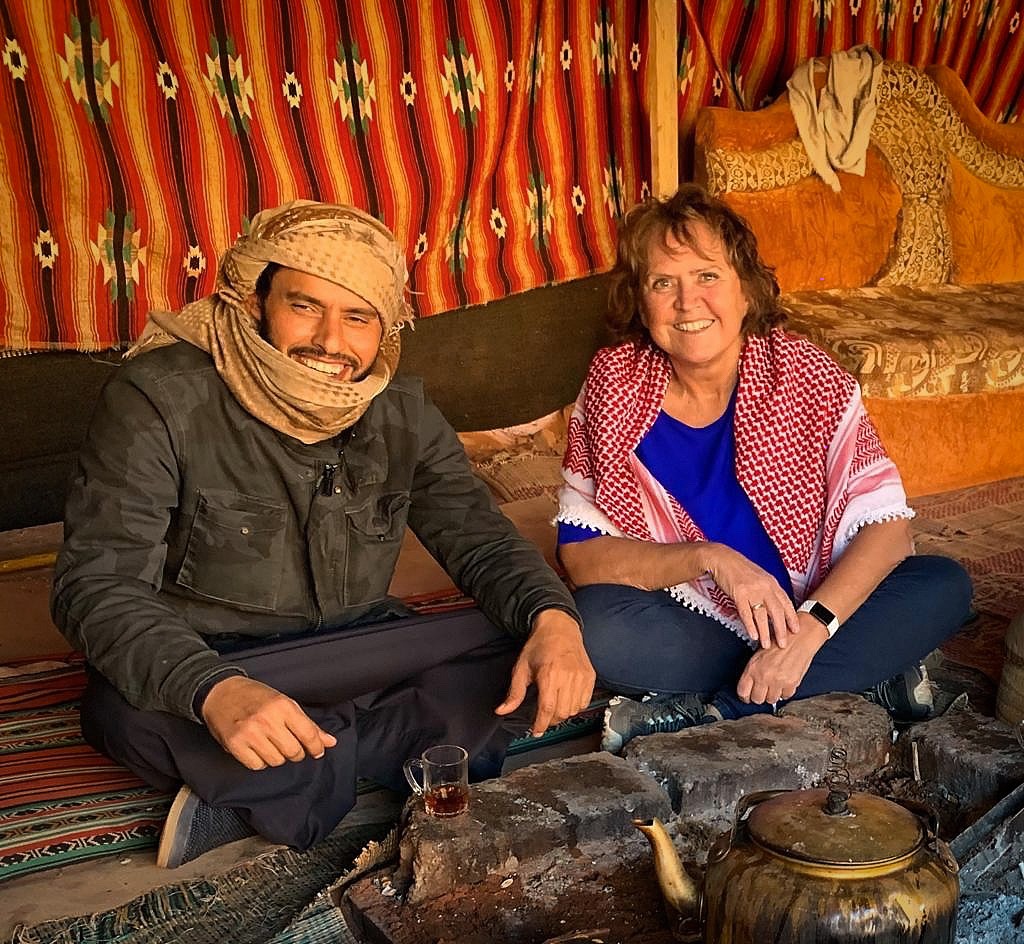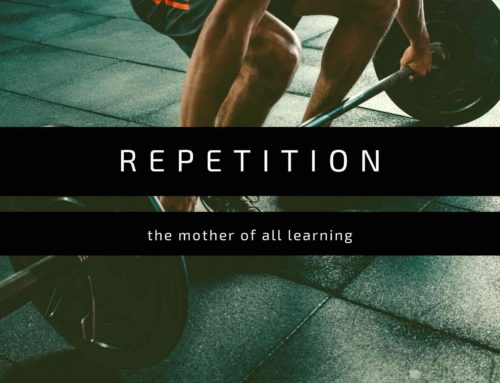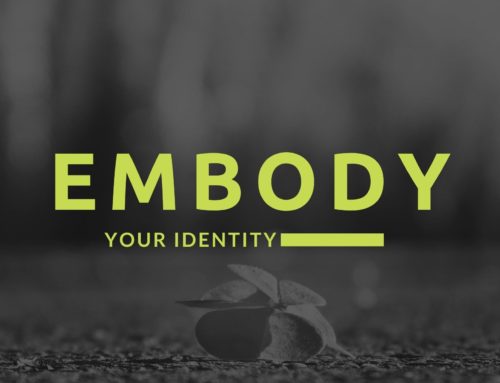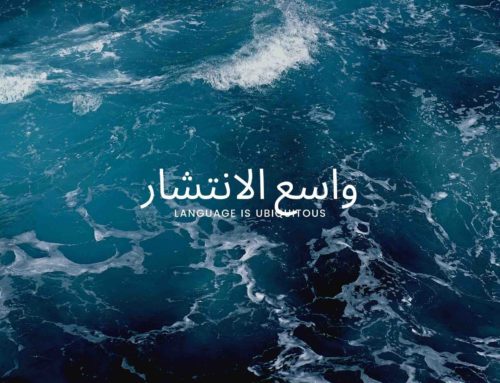Ratim. This is the name that local bedouins of Wadi Rum gave to Britt. I met her through Shababeek, my window to the world, and I couldn’t resist sharing her inspiring story with other people. At Shababeek we don’t say student; instead, we say participant because the learning process is mutual. I have shared with Britt parts of my culture, but she has given me life lessons in determination and observing differences without judgment. The following is a brief interview:
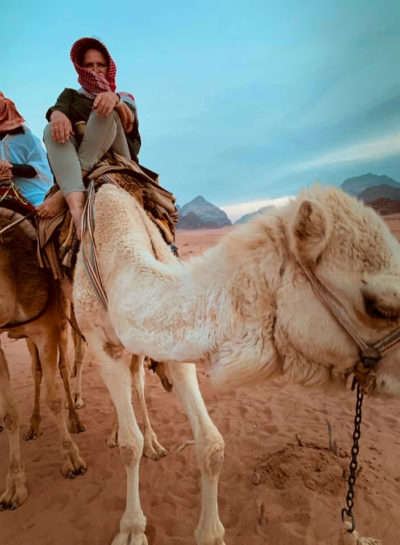
You have told me before that you felt the desert was calling you. Tell us more about this experience.
From 2015-2018, I travelled quite extensively to Palestine, as I was interested in seeing archeological sites from events and people in the Bible. Before my last visit, I heard myself saying to my husband, “I feel the desert calling me!” and we both laughed. I found myself repeating it, and felt it was rather odd every time. I had never been to any desert. Yet I was feeling my heartstrings pulled to a place I had yet to discover. I decided to visit Timna Park in Southern Palestine, knowing it was a typical desert. But there was no echo there of that calling I had felt. However, in pursuing an interest in following the path of Moses and the
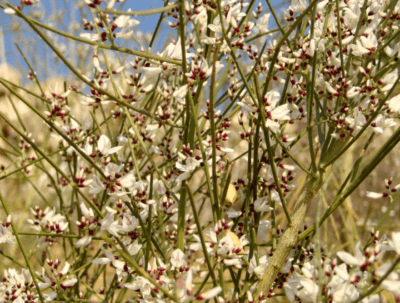
Israelites from Egypt up through Jordan, my first stop in Jordan was at Hasan Zawaideh Camp, a tourist camp in Wadi Rum.
That was when I discovered the desert that had been “calling me” to her. And what I found was far more than a desert. It was the people of the desert who proved to be my destination. Hasan became like a brother and he gave me the Bedouin name, رتم, the name of a green shrub that hugs the ground and grows low all over the desert. The Zawaidehs have become my second family. My Arabic family. Now I am living among them for a while in the village of Disi, Wadi Rum.
Many people choose to live in a cultural bubble. Why did you choose to move to a completely different environment and culture?
I don’t know if people consciously choose to live in a cultural bubble, but it is definitely the result of not exposing oneself to other cultures and other ways of thinking. I chose to spend time in Jordan because I wanted to study Arabic and get to know Arab people and Muslims in particular. When I found the Bedouin of Wadi Rum, specifically the Zawaideh family, I felt they were my reason for studying Arabic. I wanted to be able to speak with them.
When I asked my husband what he thought about my coming to live in Disi for a year, he thought about it for a couple of days. Then he said to me, “Sweetheart, not many people our age have a passion that drives them like the passion I see in your heart for these people. I think you should ride the wave. You have to go.”
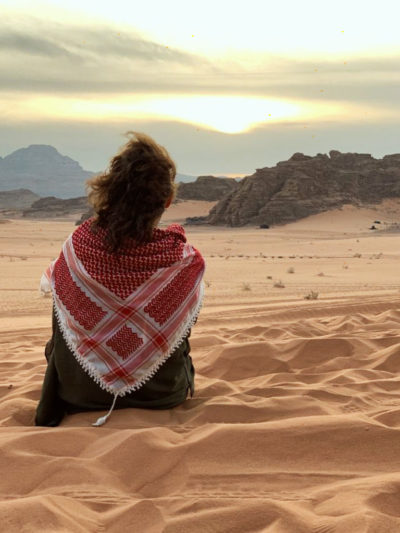
In what way has desert and bedouin life changed you?
I have discovered a people that are truly formed by their surroundings. Life here is always from one moment to the next. After all, the desert has been the same for millions of years. No change in her. Naturally, this has impacted her inhabitants. They make decisions in pace with their breathing. From one moment to the next. Not expecting anything nor fearing anything. Just being in the moment. And from this sense of always having been, like the desert, like the child in its mother’s womb, at peace with itself in a seemingly eternal existence. No expectations, no anticipation, no worries. Such is also with the culture of the bedouin, the same rest of the heart. I have had to learn to take a couple of deep breaths when someone says, “just a minute,” knowing it could be 30 or 60. Or even, “Tomorrow…insha’ Allah.” But I have learned to draw on the calming effect of the desert. The bedouin’s way of being together has also impacted me. There’s no stress to fill in any spaces in the conversation with words.
I remember Hassan invited me to go to spend the day with his extended family at his grandparent’s tent in the desert. He was not going himself, as he had work to do at the camp. But he trusted me enough to send me to them – with all my “Westernness.” I hardly knew any words in Arabic back then, but time seemingly stood still and I spent about ten hours with them, communicating without words. There were smiles, laughing, a tell-tale glance, and lots of sign language. There was total silence in the women’s quarters while the men eagerly discussed matters behind the veil in their part of the tent. As a Norwegian woman, from a country where women are totally free in their choice of partner, marriages, and society as a whole, I found myself thinking it rather odd that I was not judging what I was seeing. I was simply observing. No criticism, no opinion. When I share this experience with friends in Norway, women and men, they immediately flare up and react to the social separation between women and men, and call it discrimination. I simply call it their Bedouin tradition. Bedouin women and men both have powerful roles in local society. The roles are simply different ones than in the West.
How did you overcome the cultural shock? Do you have any tips for foreigners in Jordan?
Strangely enough, I did not experience any cultural shock in the traditional sense in coming to Jordan. However, after my numerous stays in the desert, I often experience culture shock upon returning to Norway! I believe it is because I feel alone in Norway with my deep experience of the people of the desert and their way of life and perspective. My culture is often concerned with our homes, showcasing the latest trend in home decorating, keeping everything so spotless and sterile. Superficial status symbols are also important for many Norwegians. I believe many of us could learn a lot from a simpler culture and lifestyle, a simpler way of just being together.
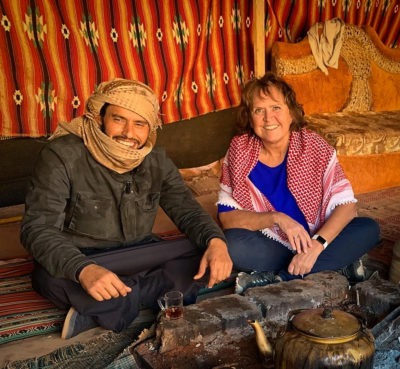
Tips for foreigners in Jordan?
Simple. Remember you are a foreigner in Jordan.
Your journey starts only when you are living here as someone who is willing to learn from locals. Living with Arabs is a process of learning about yourself. And make friends with Jordanians! Someone said it so nicely, in referring to Arab hospitality and friendliness: “If you live in Jordan and don’t have any Arab friends, it’s only because you don’t WANT to have Arab friends.”
Tell us about the cultural exchange between you and the locals.
I have arranged parties for women in my home in Disi, and I have had a gathering with many men from the village. When I see people from afar or passing in traffic, they are often waving. The children often come running, smiling and want to wish me well. I want to make a difference in the community in the time I am here. When I moved here, I just wanted to make them feel loved. And yet they are the ones making me feel loved and appreciated.
Do you believe that you need to fully understand the language to appreciate the culture?
Luckily, I do not think I need to fully understand a language to appreciate the culture, because then it would take a very long time studying Arabic before I could begin to appreciate the Arabic culture! But I believe that anyone wishing to show their respect and willingness to begin to understand another culture needs to delve into the language.
I remember an episode when I spent a weekend at a Dead Sea resort during Phase 1 at Shababeek. I went to the gift shop to purchase an item. The gentleman asked me in English which colour I would like. We had just learned the basic colours in our sessions, so I was so happy to be able to answer. “Blue, please” in Arabic. He looked at me with wide eyes, and took the blue one. We had also just learned the word for “bag,” and I was equally as thrilled to be able to say “No bag, thank you.” His eyes filled with tears, and he took some Dead Sea products, gave them to me, and said, “Because you speak to me in Arabic, here is a gift.”
Time and time again, I have seen the joy in people’s hearts when they realize I am making the effort to speak their language. That, of course, is a huge door opener into other people’s hearts, and makes them open up to include me in their culture and everyday life.
They say that language is a living creature. How do you think Shababeek Center helped you in spoken Arabic?
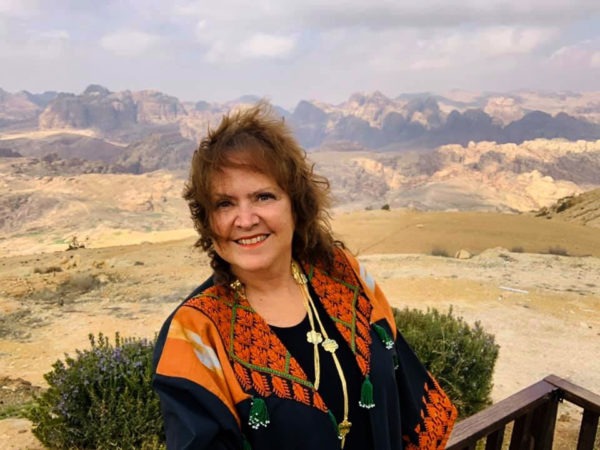
I believe that language is a carrier of cultural meaning. It evolves with its culture, and its culture evolves with it. The system Shababeek uses is priceless, as we progress through the learning process as a child learns its first language – through listening and then speaking. The fact that there is no use of any other language than Arabic in the sessions is a very great help, to say the least! This method of learning really illustrates language as a living thing, and several times in sessions I have had several miniature “Helen Keller moments” and insight into the exhilaration she felt when she broke the barrier into several facets of her life at once, when she cracked the code between words and their meanings.
Hate is another face of fear, but you walked in the way of love. As a faithful Christian why did you write about Islam?
About the same time refugees from Syria started to seek help in Europe, there was a sudden change in the mindset of the people of the West, Europe and Norway in particular. There is a rhetoric toward Muslims and Islam that has been so hateful. I decided to read the Qur’an myself to find out what was there, and I was very surprised to see many references to the God of Abraham, Jacob, and Isaac, as well as references to Jesus as God’s Word, healer, and Messiah. I wrote a book about what I discovered in an effort to affect the public debate and inform people, and to clear up so many misunderstandings as to what true Muslims believe. I wrote as a Christian minister about the Islam I discovered in the Qur’an because the hatefulness against Muslims seeking refuge in our country impacted me deeply. My desire was to build some kind of bridge of understanding. I am in no way an expert in Islam! But, I felt a need to share my own limited understanding to help bridge a gap between people.

